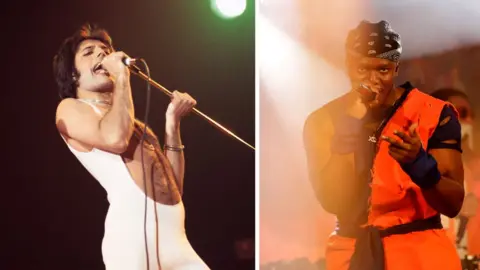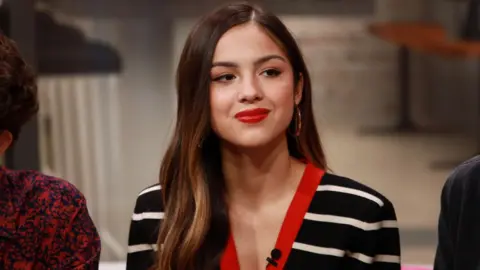Classic bands accused of crowding out new music on streaming services
 Getty Images
Getty ImagesUp-and-coming pop stars are facing "massive competition" from classic bands like Queen and the Beatles due to streaming, MPs have been told.
Any artist at the start of their career has "got the last 50 years of the music industry to compete with," Peter Leathem of rights society PPL said.
"Ultimately, you've got some of the most talented people in our society [who] are struggling to make a living."
He was speaking to a parliamentary inquiry into the impact of streaming.
Last year, three of the UK's top 10 best-selling albums were Greatest Hits collections from artists whose career peak came in the 1970s - Queen, Elton John and Fleetwood Mac.
At the same time, only one British debut album - KSI's Dissimulation - sold the 60,000 copies required to be awarded a silver disc.
Leathem said increased competition for fans' attention on streaming platforms like YouTube, Spotify and Apple Music meant that "everyone is fighting" for a share of a "smaller pie".
KSI, whose album was the 62nd best-seller of 2020, said his sales achievement was only possible because he had a pre-existing fanbase on YouTube.
"I have an advantage because I have a platform, a large platform, and I'm able to promote myself way easier than a lot of other artists," he told BBC 5 Live.
The DCMS select committee announced its investigation into music streaming in October. Previous sessions have heard from the likes of Radiohead, Nile Rodgers and Elbow's Guy Garvey, who said the way artists are paid for music on streaming services meant some musicians "can't afford to pay rent".
His comments were backed up by Mercury-nominated musician Nadine Shah, who said she had been forced to move back in with her parents because "earnings from my streaming are not significant enough to keep the wolf away from the door".
 PA Media
PA MediaOn Tuesday, MPs put those comments to the UK's top three music executives - David Joseph, CEO of Universal Music UK; Jason Iley, CEO of Sony Music UK; and Tony Harlow, CEO of Warner Music UK.
Describing Shah as a "wonderful musician" and a "fantastic songwriter", Joseph acknowledged that the current method of apportioning streaming payments was letting some musicians down.
He explained that royalties are based on "popularity" - so if someone's music accounted for 1% of all the music played on Spotify, they would receive 1% of the money generated from users' subscriptions and advertisements.
According to Music Week, however, Shah's most recent album, Kitchen Sink, has only been streamed 675,000 times, equating to 675 "sales". By comparison, the UK's current number one album, Barry Gibb's Greenfields, was streamed 2.7m times last week alone.
She releases her music on independent label Piccadilly Records.
'Streaming is not perfect'
Addressing Shah's situation, Joseph said: "It is true to say that there are some artists who have been particularly badly hit by the pause in the live business because they've got a relatively small fan base, but a very passionate fan base, that they play live to very often.
"Unfortunately, it's not possible and it's not logical that [live income] would be instantly replaced by the money that they make from their recordings."

He went on to suggest that streaming services could adopt a user-centric payment system, where "if you just listen to Nadine Shah this month" your entire subscription fee would go directly to her "rather than being diluted" by more mainstream artists.
Joseph's comments may raise eyebrows in the music industry, as the "big three" record labels were largely thought to be against the concept of user-centric payments.
The executive went on to say that "streaming is not perfect yet" and that he had "tons of ideas of how to improve streaming for the artists".
Among his suggestions were the introduction of sleeve notes, and the ability for users to opt out of data tracking, which is used to suggest songs you might like.
"I would love to have a service that wasn't based on the algorithm. I think it favours certain types of music," he told MPs.
"Perhaps we could get to a pure service like [BBC] 6 Music, where things were just being curated for people rather than data and algorithms."
 Getty Images
Getty ImagesThe three record label bosses collectively rejected previous characterisations of their business model as exploitative or unfair to musicians.
They denied that artists were "too scared" to speak out about their payments for fear of reprisal; and rejected the idea that aspiring musicians had no option but to sign standardised contracts with major labels.
"The idea that three major record labels are putting down on the table three exact similar deals on a take-it-or-leave-it [basis] feels like something from 50 years ago," said Iley. "Every deal is different."
The executives also rebuffed claims that record contracts still include penalties for physical breakages - meaning 10% of an artist's royalties are automatically deducted to cover the cost of damaged vinyl and CDs, even when the majority of music is being played online.
"From Sony Music's perspective that is not true, that does not happen," said Iley.
"In terms of digital royalties they are 100% clean," added Joseph.
The labels also defended the current business model - where musicians receive an average of 20 to 25% of the royalties generated by their music - saying any disruption could damage investment in new music and "diminish UK competitiveness".
The streaming market is "an evolving situation," said Harlow. "It is being well-governed by a market that is efficient and nimble and it doesn't need any change.
"We need to be getting on with making the UK the absolute best place to invest in music."
'Lack of clarity'
In one stormy exchange, the CEO of Universal Music was reprimanded by DCMS committee chairman Julian Knight MP, after repeatedly failing to answer a question on whether his company had cut royalty rates to its artists following a deal with Spotify in 2017.
"The question is very simple," said Mr Knight. "You are in front of a Parliamentary Select Committee now. In the past, with the likes of Google, Facebook, YouTube and Twitter - we have found them to be frankly dissembling and not being in any way [clear]. So far I have to say you are beating them to the prize in terms of lack of clarity and lack of actual openness to a Parliamentary Committee."
Joseph, citing the commercially-sensitive nature of the requested information, said he would provide an answer to the committee in written form.
 Getty Images
Getty ImagesAhead of Tuesday's hearing, the BPI, which represents the recorded music industry, released figures suggesting that streaming was working in artists' favour.
It said that 1,800 artists had achieved more than 10 million streams in the UK during 2020, the equivalent of selling 10,000 CDs.
Based on per-stream averages, that would mean those artists each earned £29,400 last year from streams in the UK alone.
The BPI said streaming has also made the market more "democratic" - with the top 10 artists accounting for just 5% of all music streamed last year.
When CDs were the dominant form of music consumption in 2005, the top 10 artists were responsible 13% of all sales.

Follow us on Facebook, or on Twitter @BBCNewsEnts. If you have a story suggestion email entertainment.news@bbc.co.uk.
